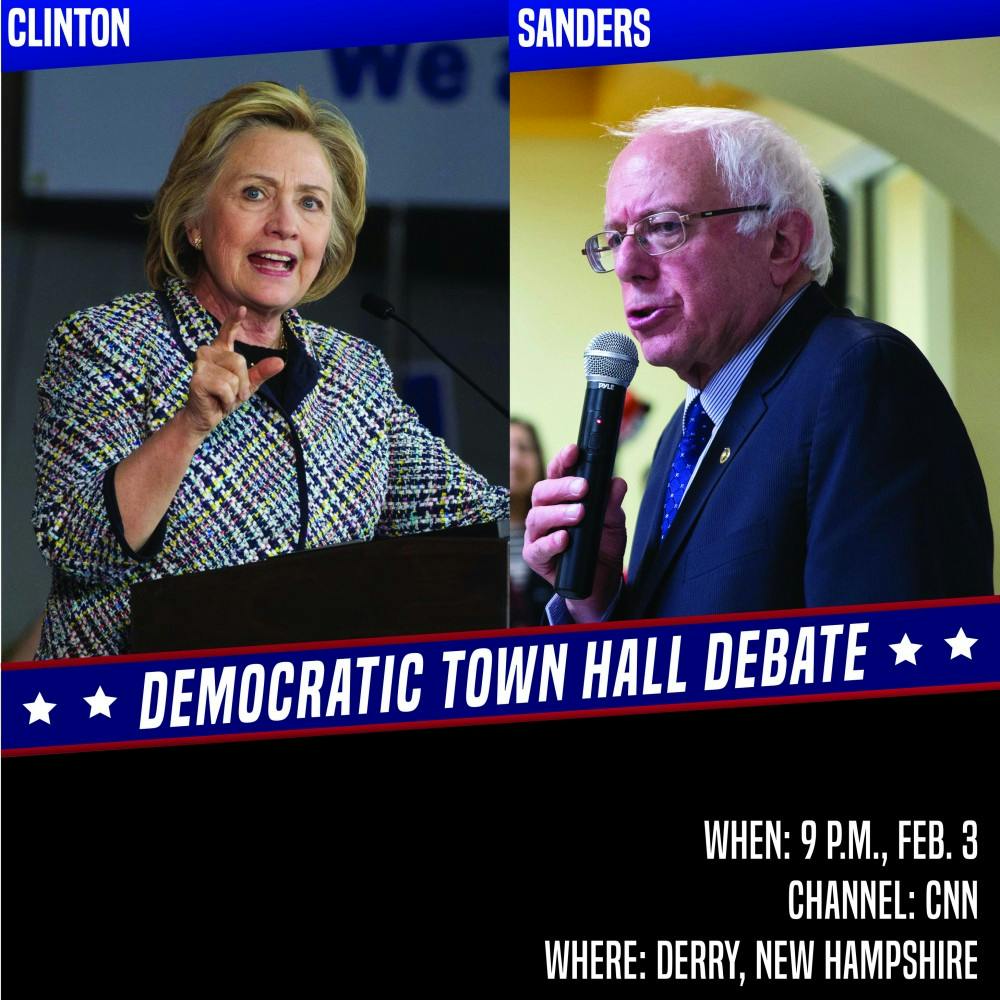After its delayed start due to the suspension of former Maryland Gov. Martin O’Malley’s presidential campaign, Wednesday's Democratic town hall in New Hampshire kept a fast pace of questions and answers between prospective voters and candidates. Anderson Cooper hosted the event on CNN, asking and moderating questions directed to former Secretary of State Hillary Clinton and Sen. Bernie Sanders (I-Vt.).
One of the more notable moments of the night occurred when voter Chris Brownell asked Sanders if raising taxes would hurt the middle class. Sanders responded by arguing that these higher taxes would replace the costs of healthcare and ultimately help the middle class offset his proposed tax increases.
“I believe that healthcare is a right to all people,” Sanders said.
While economic issues were often directed to Sanders, he did field questions about race and terrorism. Boston Marathon bombing survivor Denise Spenard asked about future plans for facing terrorism: Sanders replied that he would destroy ISIS, but would not want to go against American values of democracy and opportunity in the fight against terrorism. He said the United States should be accepting more refugees from Syria and Afghanistan.
Though Sanders recognized how Clinton has secured a lot of support from female voters, he explained he would be stronger at addressing issues minorities face in the United States.
“There will be no president who will fight institutional racism more than I do,” Sanders said.
After stating his desire to demilitarize local police in response to a question of combating racial injustice, Sanders confirmed his participation in the Congress of Racial Equality at the University of Chicago when he was 20.
One of the more salient issues throughout the course of the 2016 presidential election has been bipartisanship. With a Republican majority in both chambers of Congress, Sanders said he would plan to work across aisle and make compromises in order to implement his ideas.
On the topic of taking on Clinton, Sanders stated he would never and has never run a negative advertisement. But he did question how effective Clinton could be as president if she continues receiving campaign contributions from wealthier donors.
“I do not know any progressive who has a Super PAC and pegs $15 million from Wall Street,” Sanders said.
As the town hall progressed, Clinton replaced Sanders on the stage and took her turn answering questions from prospective New Hampshire voters.
Though Clinton supported the Iraq War at the time it was introduced, she said she would work hard to prevent further U.S. military forces on the ground.
“I will do everything I possibly can to prevent sending American troops abroad,” Clinton said.
Like Sanders, audience members questioned how Clinton would implement her policies as a Democratic candidate in a Republican-controlled Congress.
Clinton said she has had a lot of experience in dealing with political opponents. But she did not hesitate to criticize the Republican Party. Clinton said that Republican candidates are informed but run the risk of being corrupted by wealthy contributors like the Koch brothers.
Clinton did admit that she has done endorsements herself, including being paid $675,000 by Goldman Sachs to serve as a guest speaker, but she said this was not an uncommon practice from previous people who have served as Secretary of State.
When one audience member brought up the need for marijuana use to ease pain, Clinton explained she thought more research should be done about the benefits of medicinal marijuana. She later added she would work to provide more treatment for those addicted to drugs and alcohol.
The candidates will have no time to rest: they will be participating in a debate Feb. 4 at 9 p.m. airing on MSNBC.


